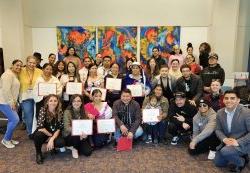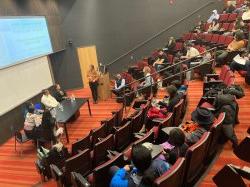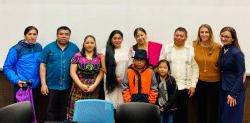弥合文化
Spanish class connects students with Indigenous roots and heritage
发布: 网页新闻及活动, 西班牙语和拉丁裔研究

The class Spanish for Heritage Learners is about much more than proper grammar, 拼写和标点符号. 把这一点讲清楚, Spanish 语言 Coordinator 安东内拉·Calarota-Ninman·拉斯泰利 invited members of four different Indigenous groups from Latin American countries to speak to her students. The class watched a film about a Guatemalan Indigenous community before a presentation by the visitors followed by an engaging class discussion.
Hearing from Indigenous groups has “double meaning for students because maybe they’re not directly connected to the community but it’s like their neighbors in their country of origin or their parents or their grandparents,卡拉罗塔-宁曼说, “that’s why I wanted to do it with this class specifically.”
She says the class goes beyond grammar and speech. “It’s building a bridge between who they are here in the United States and their heritage,” she says. “Many of them are born here and may lose contact with their past. So, in the class what I do is try to empower them, helping them understand that their bilingualism and their biculturalism is a gift and it’s precious.”
Rising sophomore 心理学 major Andrea 龙头、 says she enrolled in the class to improve her communication skills. “I wanted to learn how to communicate better in Spanish with my family members,” she says.
龙头、, 谁是秘鲁后裔, says she learned from Indigenous speakers from Ecuador that the Indigenous languages of the two countries – quechua and Quichua or Kichwa – are quite similar.
She also says she was sad to hear from the group that because they are among the first to live in the U.S., their “whole tradition is not expressed here in the United States and even within the Hispanic community.”
“我发现它非常有影响力,”她说.

丹尼Tarifa-Ramirez, a rising junior Film and Television major of Venezuelan descent, 说,他, 太, appreciated the discussion about keeping traditions and culture alive even as Indigenous groups also adapt to societal and technological changes. “They talked about how they have astrological apps for understanding harvests; I think that’s a good way they use technology for the benefit of their communities.”
作为一个说西班牙语的人, Tarifa-Ramirez 说,他 was able to focus on learning linguistics and different Latin American 文化 and cultural contexts. “The cultural references and how they vary from country to country, 这对我来说非常重要.”
As part of the class final, the students produced oral history projects. 龙头、 interviewed a Peruvian nurse about her career in various countries before her arrival in the U.S. Tarifa-Ramirez interviewed a Guatemalan and Venezuelan musician about “how his culture influenced his artistry and how his music is influenced by his culture.”
The projects are likely to become a part of Hola 十大博彩推荐排名州立 (Historia Oral de los Latinos y Archivo digital) [http://holamontclairstate.org), which was launched last year by an interdisciplinary group with faculty from the 西班牙语和拉丁裔研究, 社会学, 以及教学部门. HOLA is “essential to preserve Indigenous 文化, 语言和传统, as well as stories of the Latino communities on campus and in New Jersey,卡拉罗塔-宁曼说.
This collaborative effort began in 2023, when Calarota-Ninman invited a group of 12 Indigenous leaders from the various groups, 包括Kichwa族人, Tlapanec, Mije和Mam, to be interviewed by her Spanish 135 students and be part of the oral history project. Calarota-Ninman says the day was very meaningful for her and the students, 谁知道这个团体的故事, 文化, 传统与斗争.
“I decided to continue the collaboration with these leaders who have a lot to share and to teach,卡拉罗塔-宁曼说. “Informing our community about this collaboration with leaders of different Hispanic Indigenous communities is very important. It will not only awaken interest in those students who are descendants of these groups but also will enrich our community with their knowledge and wonderful culture.”

Story by 大学 Communications Staff Writer 西尔维娅一个. 马丁内斯. 图片由 安东内拉·Calarota-Ninman·拉斯泰利.
